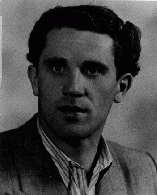
Pinchas Gerszonowicz
Born: January 21, 1921
Miechow, Poland
Pinchas was born into a large family living in the town of Miechow in south central Poland. His father was a machinist and locksmith. Pinchas spent long days studying, either learning Hebrew in the Jewish school or taking general subjects at the public school. He belonged to the Zionist youth organization, Ha Shomer ha-Tsa'ir, and played left wing for a Jewish soccer team.
1933-39: At 13 Pinchas finished school and started work as an apprentice machinist and blacksmith in a building contractor's shop. When the German army invaded Poland in 1939, his parents decided that Pinchas and his older brother, Herschel, should flee to the Soviet-occupied part of Poland. They were on foot and no match for the motorized German division that overtook them about 150 miles east of Miechow. There was nothing else to do but return home.
1940-44: Pinchas repaired vehicles for the Germans in Miechow and later, at their Krakow airbase. In July 1943 he was deported to Krakow's suburb of Plaszow, where the Nazis had established a labor camp over a very old Jewish cemetery. There, he worked as a machinist and blacksmith with his father. Every day he saw Jews being shot by the SS guards or torn to death by dogs. The camp's commander, Goeth, always had two large dogs with him. All he had to say was, "Get somebody!" Pinchas never knew if his last minute was approaching.
Pinchas was deported to Auschwitz in early 1945. One of the few survivors of a two-week death march, he was liberated near the Dachau camp in April. He immigrated to the United States in 1948.